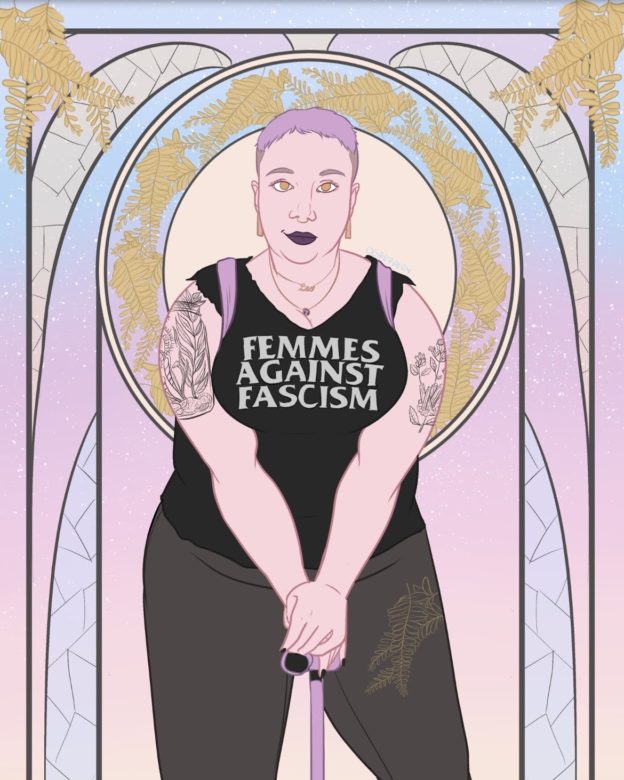-
Why did you apply to HASTAC?
In composition/rhetoric and writing studies, digital pedagogy is a crucial element of developing effective and equitable pedagogy! Building community around digital equity is an important component of centering access in future intellectual projects 🙂
-
What has been your favorite course so far as an instructor or student? Why?
My first semester of my doctoral program, I took Dr. Carmen Kynard’s #BlackGirlMagic: @ The Intersections of Literacies, Public Pedagogies, and Black Feminisms with a large group of radical scholars from departments ranging from Urban Education to Critical Social Psychology. Dr. Kynard is a comp/rhet scholar, like me, but her commitment to expansive and creative pedagogical and scholarly approaches, and to centering Black multiply-marginalized scholars, was a revelation. She valued each student’s contributions and held space for emotionality and critique while discussing difficult and personal subjects, and I’m lucky to continue working with her as I develop my dissertation project!
-
What do you want to do after you graduate?
Well, I’m chronically ill and disabled, so my plans are impacted by how I can build accessible intellectual labor into a life that centers care and rest.
-
What’s something that people would be surprised to know about you?
Haha, I’m kind of an open book! But if we’re not pals, you probably don’t know that I waited tables for 10 years! My previous career has heavily impacted how I think about class, and especially about how higher ed ensures that graduate school is disproportionately difficult for working-class and poor folks.
-
What are some things that you wish you knew before you got into graduate school?
One of my biggest hurdles in doctoral study has been getting my access needs met. Disability services for students are usually staffed by non-disabled people with limited training in disability justice, which is the only ethical, disabled-led framework from which to practice accompliceship with sick and disabled people. I would have seriously reconsidered my decision to pursue my PhD had I known the extent of uncompensated labor I would have to perform to secure basic access protocols like captioning, ergonomic seating, flexible deadlines and attendance. Disability services for students should be required to advocate on behalf of students and actually apply pressure to faculty who refuse to accommodate disabled students, rather than guarding the university against potential ADA lawsuits.
-
How do you envision HASTAC and/or higher education in 10 years? Where do you fit in?
Following abolitionist scholars like Bettina Love, Eve Tuck, and Ruth Gilmore Wilson, I am not heavily invested in the reform of higher education in the U.S. Universities largely function as caste-based social order and discipline actors, and reward assimilation of white supremacist cultural values like perfectionism, concentration of hierarchical power, and obsession with false objectivity (see White Supremacy Culture in Organizations). Instead, I dream of free school collectives following the radical Black tradition, anti-capitalist intellectual and creative projects organized by people too sick to meet ableist benchmarks of higher education, and autonomous interdependent care collectives reading theory in bed.
-
How does digital scholarship fit into your research or teaching?
I’m working on my dissertation, and a big component that I’m excited to dive more into is a digital gallery of memes and macros created by disabled artists! Also, I taught the first ever hybrid first-year writing seminar at CCNY in 2018 with fellow doctoral student and professor Andréa Stella. Both of my current fellowships, with the OpenLab at City Tech and the CUNY Humanities Alliance, respectively, focus on programmatic and pedagogical uses of digital technologies in higher ed. I hope that folks suddenly embracing digital pedagogies this year will open the door to explorations of how hybrid and fully online asynchronous courses can increase accessibility for CUNY students!
-
What do you hope to accomplish with your research or teaching?
Integrated radical access for all students, staff, and faculty, disruption of siloed intellectual disciplines, critical self-reflection, and pedagogies of care.
-
What are you currently reading, watching, or listening to?
Rewatching Grey’s Anatomy for the 4th or 5th time! I’m writing a book about it, so it’s great for research and for drama. Reading Glitch Feminism by Legacy Russell and I Hope We Choose Love by Kai Cheng Thom, listening to The Color of Money by Mehrsa Baradaran.
-
What’s something we should ask you? What’s your answer?
How can white academics address our complicity in systemic anti-Blackness?
Chances are good that we are under-educated on Black cultural history, public policy that impacts Black folks, and how anti-Blackness is embedded into American sociopolitical life. Our first responsibility is to read, watch, and listen widely to work by Black scholars. I recently created a short bibliography of texts that have impacted my understandings of systemic anti-Blackness on my personal website (link HERE).
***Featured image by Michaela Oteri***

One response to “Scholar Spotlight: Jesse Rice-Evans”
I want to be in your class Jesse!! So inspiring!! Have you heard of artistt William Utermohlen? He was an artist who shared unique perspective of having Alzheimers. When I studied art therapy, I did a paper about him. It is on disc though and I have to order a adapter to transfer the files. I will share. Also, excellent point about disablity services at the university level. Most do not, or have not had a family member with a (dis)ability. When I would hand the profs my note from the Disability Office with recommendations for accommodations some would look at me sideways. At the college level, one needs to espcially be their own advoate. Thank you for sharing your story. Best to you! 🙂
Here’s a link to learn more about William’s work:
http://boicosfinearts.com/exhibitions/william-utermohlen-a-persistence.html